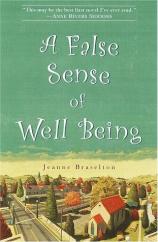Author Talk: October 2001
Kaye Gibbons: Interviewers always ask the same questions, don't they? What time of day do you write? Do you use a computer or write longhand? Who are your favorite writers? Why do you write about the South? What is the role of the Southern writer in society? What makes Southern literature unique?
Jeanne Braselton: Oh my, yes. Let's not talk about that.
KG: After being asked a few too many of these sorts of questions, I have to fight the urge to give completely ludicrous answers.
JB: I once told someone that I write in longhand on the walls of my house, and repaint when I start a new novel. He looked a little alarmed.
KG: The most impossible question--and it always pops up every few years on literary panels--is: "Are we witnessing the death of Southern fiction?" I've been hearing that one for at least fifteen years, and Walker Percy, Shelby Foote, Eudora Welty, William Faulkner, Katherine Anne Porter, and Flannery O'Connor were asked the same thing.
JB: They were tired of trying to answer that one, too. It's the kind of question that makes a writer a little batty. I'm pretty sure it was you who once said, "We're still writing, aren't we?" I've always loved and admired you for saying that because, in the end, what more can be said? Most writers, though, fall into a peculiar kind of hypnotic state induced only by academics who ask questions like that, and end up talking about the pervasive influence of television, the homogenization of the South, with a McDonalds and a Holiday Inn in every city, and the fact that a good many people would rather watch football or get their teeth cleaned than read novels.
KG: As if having a McDonalds on every block is ruining our culture. Indoor plumbing didn't ruin the South, so why should McDonalds? We stopped having to write about making trips to the outhouse in the middle of the night, but that didn't stop us from writing.
JB: You can find a McDonalds, and probably a Holiday Inn, in every major city in the world. I have a friend who once traveled inside the Arctic Circle, and he walked into this shed--an igloo really--and all these people were huddled around in fur coats watching--not a fire, but MTV. And who knows? Maybe we are witnessing the death of Southern fiction, and fiction in general, or at least a debilitating illness. It's my understanding that every junior editor in New York claims to be looking for the same thing--'narrative nonfiction and the occasional novel.' And yet there seems to be more fiction out there than ever before. I can't keep up with it all.
KG: Sometimes I think being stuck with the label of "Southern writer" is a form of literary discrimination perpetuated by the, critics.
JB: It's a label that sticks. I can't think of another regional category, except for "Western," and we all know that doesn't refer just to the region, but to the genre. Call someone a Southern writer and you immediately think of a certain style, like calling someone a science fiction writer, or a mystery writer, or a romance writer. The problem is that the best Southern fiction today is too diverse for that.
KG: Faulkner's works have been translated into almost every language on the planet, and even as he was being presented with the Nobel Prize in Literature, he was introduced as "essentially a regional writer" and the "great epic writer of the southern states."
JB: John Cheever was never asked if he considered himself a Northeastern writer.
KG: Right. Because Cheever wrote about the suburbs instead of Yoknapatawpha County.
JB: Gin instead of moonshine. I guess that's considered more American.
KG: What about those of us who write about the suburbs in the South?
JB: Then they call it writing of the "New South," another category that's been around forever. I'd like to know who came up with that term, because whoever it was deserves to be slapped. It probably was a politician. People have been talking about the "New South" for at least fifty years, and it's mostly politicians promising "new" this and "new" that. Now, every year or so, somebody puts out a collection of fiction called "Writing of the New South" or some such. As far as I can tell, there's nothing new about it.


